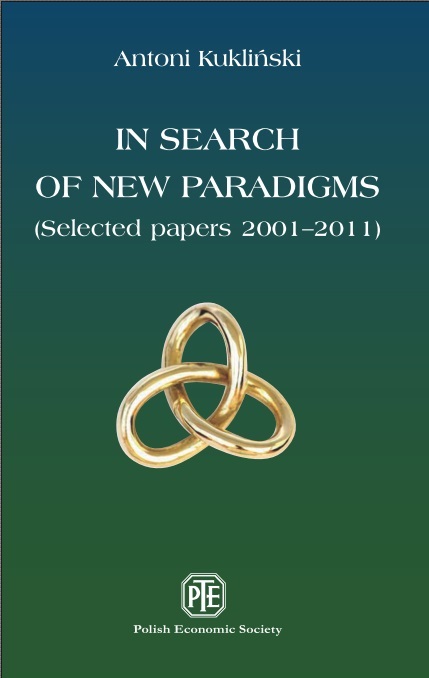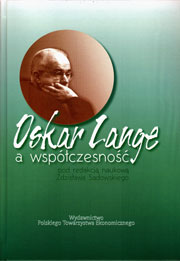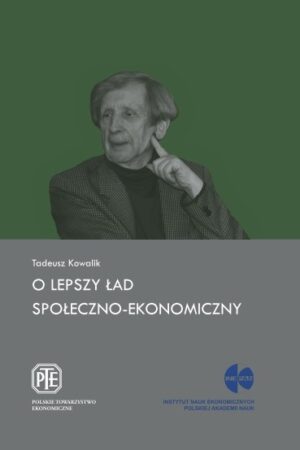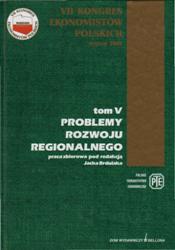Opis
A Well Interpreted Future: The Contribution of Antoni Kukliński
The Polish Economic Society (PTE) gives Readers a book “In Search of New Paradigms” that is a synthesis of the studies, analyses, and reflections of Professor Antoni Kukliński on the subject of shaping the future. 1 The book has been published by the PTE on the occasion of the eighty-fifth birthday of its Author. This anniversary edition is primarily focused on the culture of strategic thinking due to the fact that Professor Kukliński has devoted a considerable part of his academic life to this issue, which is reflected in
the research work of this distinguished scholar, who has rendered great service to futurology.
Antoni Kukliński points to the necessity to seek a new pa- radigm, or pattern of thinking, that would be well-suited to the requirements of the new civilization. If the point of departure for developing a new paradigm, and indeed, its essence, consists of sets of questions directed at exploring the future, as well as of patterns of thinking and tools aimed at answering these questions, then the very process of formulating the questions may be treated as an important factor conducive to strategic reflection.
Thus, it is no accident that the title of Antoni Kukliński’s work reads “In Search of New Paradigms.” Discussing the dysfunctions of the contemporary world, Kukliński indicates the need to move from a knowledge-based economic model to a wisdom-based one, and expresses criticism of so-called “conventional thinking” and “conventional wisdom.”
Antoni Kukliński refers to three theoretical and methodological inspirations that he has found in the works of three authors: Gunnar Myrdal, John Kenneth Galbraith, and Thomas Kuhn. 2 Drawing on the intellectual legacy of these eminent thinkers and economists, Kukliński formulates an innovative proposal to the effect that that legacy should be integrated by the economic community and used for developing new patterns of thinking about the future.
Antoni Kukliński emphasizes Myrdal’s conclusion that “theory in this context means nothing more than a logically correlated system of questions addressed to the material.” This corresponds both to Galbraith’s critique of conventional wisdom and to Kuhn’s work on scientific revolutions.
Antoni Kukliński’s novel proposal constitutes a challenge for researchers and the economic community, and especially for the Polish Economic Society. 3 It should be an inspiration for
developing a new international and interdisciplinary research program devoted to “the role of paradigmatic thinking in the development of social sciences.”
Kukliński’s work delineates the function of strategic research institutions and teams, strategic advisory teams, and strategic think-tanks. In Poland, the role they play is certainly insuffi cient. While to some extent this is the effect of aversion to planning (associated with the previous political system), given the time that has elapsed this may also be linked to an uncritical belief in market infallibility. And if the market is taken to be infallible, forecasts are irrelevant. However, such an approach itself has turned out to be quite fallible, which has been spectacularly demonstrated by the global fi nancial crisis.
History provides considerable evidence that nothing works so well for the present as a well thought-out future. Although detractors will say that the only sure thing about forecasts is that they do not come true, the importance of strategic thinking and the need for it are unquestionable. Anticipatory reflection about the future helps to optimize day-to-day decisions and current actions, which always augurs well for the future. One should not be discouraged by the proverb “when man makes plans, God laughs.” Perhaps God is actually content?
From the presented work by Antoni Kukliński it follows that the need for long-term strategies increases with the degree of uncertainty of action and the risk of making mistakes. When the world is unpredictable, the fundamental function of strategic reflection is warning and anticipatory identification of potential development trends, and most of all, drawing attention to the least predictable threats and risk areas.
It is not by accident that Antoni Kukliński cautions that the trajectory ‘information – knowledge – ability to predict the future’ is not functioning effectively. Despite the ongoing IT revolution with the dramatically expanding information and knowledge resources, recent years have seen intensifi ed connivance – a cognitive and pragmatic attitude which purposefully ignores information about the actual state of affairs in the decision-making process.
The European Commission has had full knowledge of the condition of Greek public finance and the way it functioned for 10 years. However, this information and knowledge of the actual state of things was not part of the EU’s decision making process.
Marginalization of strategic thinking has also to some extent affected the European Union and, in general, the Western world. In contrast to this, the Asians, and especially the Chinese, attach great importance to forecasts and scientific predictions. An excellent case in point is “The New Asian Hemisphere” by Kishore Mahbubani, the Asian guru of new ideas, who predicts the end of the absolute dominance of the West and Asia’s gradual assumption of the role of the world’s leader in the 21st century. A similar message is conveyed by the 40-year forecast presented by Jorgen Randers in the latest report of the Club of Rome “2052 – A Global Forecast for the Next Forty Years.”
By analogy to the concept of invented tradition, which is found in the world literature, Professor Antoni Kukliński has formulated the term invented future. He writes that “invented future in the perspective of 2020 or 2050 is not as preposterous a task as it would at first seem. Invented future is a future with new structures and new driving forces for development processes which would be difficult to imagine or unimaginable here and now.”
The responsibility to care for the future rests with politicians, members of parliament, governments, and economists. As it was emphasized many decades ago by a representative of the Austrian school, Henry Hazlitt, the art of economics consists in looking not merely at the immediate but at the longer effects of any act or policy; it consists in tracing the consequences of that policy not merely for one group but for all groups. 5 Nonetheless, there is plentiful evidence that the above responsibility is often ignored by those in power, as they are subjected to the terror of the election cycle. Thus, one could argue that politicians are more concerned with the fate of future elections than with the fate of future generations.
The need for strategic thinking is compelling also today, especially in the context of the last crisis and its causes. One of them is short-sightedness in economics and politics and the disappearance of strategic thinking in the Western world. Ample evidence for the above is given in Antoni Kukliński’s book, which I highly recommend.
Let me here express my wishes for the distinguished Author of this book to publish many more equally inspiring and important works.
Elżbieta Mączyńska






Opinie
Na razie nie ma opinii o produkcie.